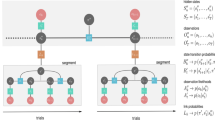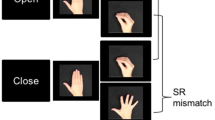Abstract
In this paper, we study the expansion of a reactive network that is based on a decentralized, heterarchical architecture able to control a hexapod robot. Within this network, problems may occur if more than one task should be addressed within a short time window. Such situations have been studied in so called dual-task experiments in the field of psychology. We take these results as inspiration to develop a structure that can be integrated into our framework. The model focuses on essential aspects of the basic phenomena observed in human subjects as forward masking, backward masking and PRP. While there are detailed models available concentrating on specific paradigms, those do not cover all three types of paradigms. We are not heading for a detailed simulation of the psychological findings, but show how these effects, on a qualitative level, can be implemented in our framework.
Access this chapter
Tax calculation will be finalised at checkout
Purchases are for personal use only
Preview
Unable to display preview. Download preview PDF.
Similar content being viewed by others
References
Schneider, A., Paskarbeit, J., Schäffersmann, M., Schmitz, J.: Biomechatronics for embodied intelligence of an insectoid robot. In: Jeschke, S., Liu, H., Schilberg, D. (eds.) ICIRA 2011, Part II. LNCS, vol. 7102, pp. 1–11. Springer, Heidelberg (2011)
Maes, P.: A bottom-up mechanism for behavior selection in an artificial creature. In: Proceedings of the First International Conference on Simulation of Adaptive Behavior on From Animals to Animats, pp. 238–246 (1991)
Schilling, M., Paskarbeit, J., Hoinville, T., Hüffmeier, A., Schneider, A., Schmitz, J., Cruse, H.: A hexapod walker using a heterarchical architecture for action selection. Frontiers in Computational Neuroscience 7 (2013)
Dürr, V., Schmitz, J., Cruse, H.: Behaviour-based modelling of hexapod locomotion: Linking biology and technical application. Arthropod Structure & Development 33(3), 237–250 (2004)
Schilling, M., Hoinville, T., Schmitz, J., Cruse, H.: Walknet, a bio-inspired controller for hexapod walking. Biological Cybernetics 107(4), 397–419 (2013)
Cruse, H., Wehner, R.: No need for a cognitive map: Decentralized memory for insect navigation. PLoS Computational Biology 7(3) (2011)
Hoinville, T., Wehner, R., Cruse, H.: Learning and retrieval of memory elements in a navigation task. In: Prescott, T.J., Lepora, N.F., Mura, A., Verschure, P.F.M.J. (eds.) Living Machines 2012. LNCS, vol. 7375, pp. 120–131. Springer, Heidelberg (2012)
Cruse, H., Schilling, M.: How and to what end may consciousness contribute to action? attributing properties of consciousness to an embodied, minimally cognitive artificial neural network. Frontiers in Psychology 4(324) (2013)
Fehrer, E., Raab, D.: Reaction time to stimuli masked by metacontrast. J. of Experimental Psychology 62, 143–147 (1962)
Neumann, O., Klotz, W.: Motor responses to non-reportable, masked stimuli: Where is the limit of direct parameter specification? In: Umiltà, C., Moscovitch, M. (eds.) Attention and Performance XV, pp. 123–150. MIT Press, Cambridge (1994)
Schmidt, T., Niehaus, S., Nagel, A.: Primes and targets in rapid chases: Tracing sequential waves of motor activation. Behav. Neurosc. 120, 1005–1016 (2006)
Pashler, H.: Dual-task interference in simple tasks: Data and theory. Psychological Bulletin 116, 220–244 (1994)
Jolicoeur, P., Tombu, M., Oriet, C., Stevanovski, B.: From perception to action: Making the connection. In: Prinz, W., Hommel, B. (eds.) Attention and Performance. Common mechanisms in perception and action, vol. XIX, pp. 558–586. Oxford University Press, Oxford (2002)
Schneider, W.: Selective visual processing across competition episodes: a theory of task-driven visual attention and working memory. Phil. Trans. R. Soc. B 368(20130060) (2013)
Ansorge, U., Klotz, W., Neumann, O.: Manual and verbal responses to completely masked (unreportable) stimuli: exploring some conditions for the metacontrast dissociation. Perception 27, 1177–1189 (1998)
Enns, J., Di Lollo, V.: What’s new in visual masking? Trends in Cognitive Sciences 4, 345–352 (2000)
Carrier, L.M., Pashler, H.: Attentional limits in memory retrieval. Journal of Experimental Psychology: Learning, Memory, and Cognition 21, 1339–1348 (1995)
Hommel, B.: Automatic stimulus-response translation in dual-task performance. J. Exp. Psychol. Hum. Percept. Perform. 24, 1368–1384 (1998)
Zylberberg, A., Dehaene, S., Roelfsema, P.R., Sigman, M.: The human turing machine: a neural framework for mental programs. Trends Cogn. Sci. 15, 293–300 (2011)
Bundesen, C., Habekost, T., Kyllingsbæk, S.: A neural theory of visual attention and short-term memory (NTVA). Neuropsychologia 49, 1446–1457 (2011)
Author information
Authors and Affiliations
Editor information
Editors and Affiliations
Rights and permissions
Copyright information
© 2014 Springer International Publishing Switzerland
About this paper
Cite this paper
Cruse, H., Schilling, M. (2014). Action Selection within Short Time Windows. In: Duff, A., Lepora, N.F., Mura, A., Prescott, T.J., Verschure, P.F.M.J. (eds) Biomimetic and Biohybrid Systems. Living Machines 2014. Lecture Notes in Computer Science(), vol 8608. Springer, Cham. https://doi.org/10.1007/978-3-319-09435-9_5
Download citation
DOI: https://doi.org/10.1007/978-3-319-09435-9_5
Publisher Name: Springer, Cham
Print ISBN: 978-3-319-09434-2
Online ISBN: 978-3-319-09435-9
eBook Packages: Computer ScienceComputer Science (R0)




